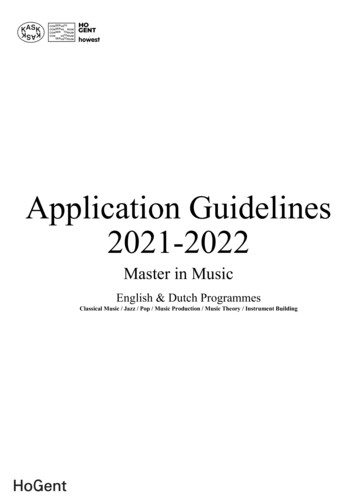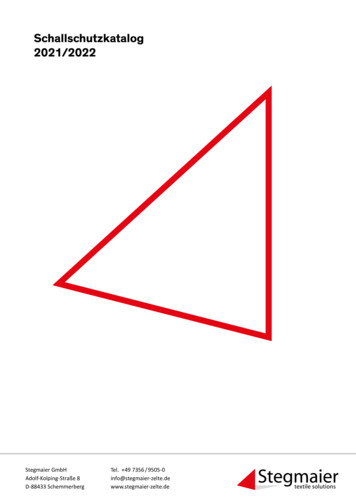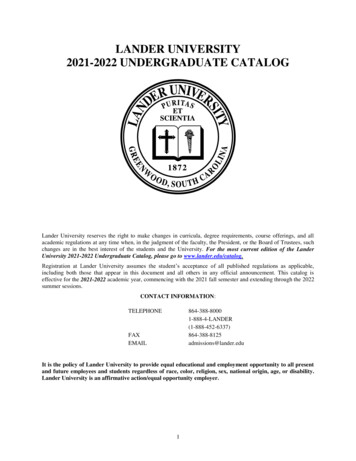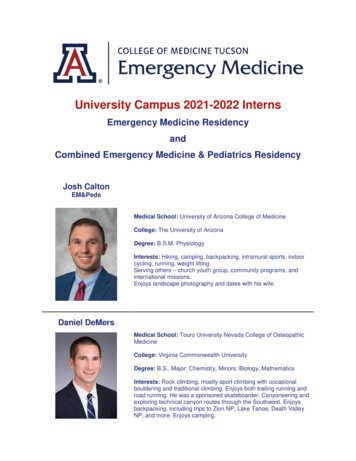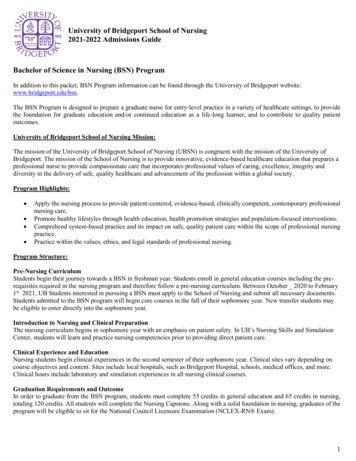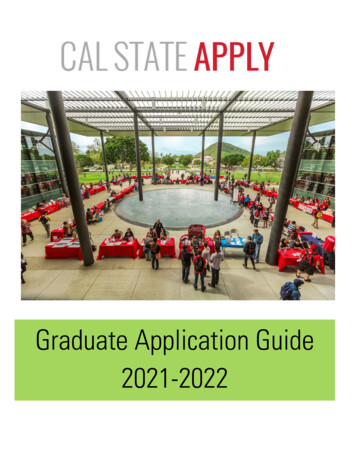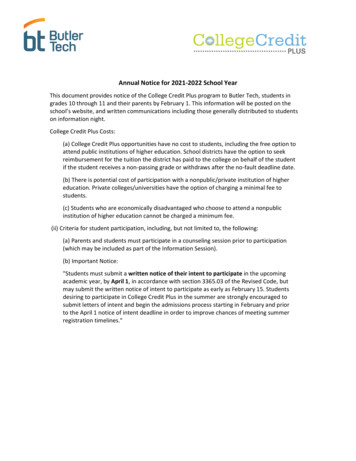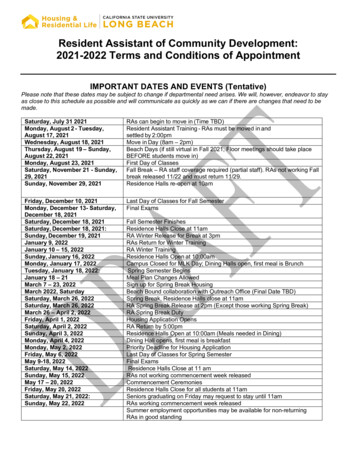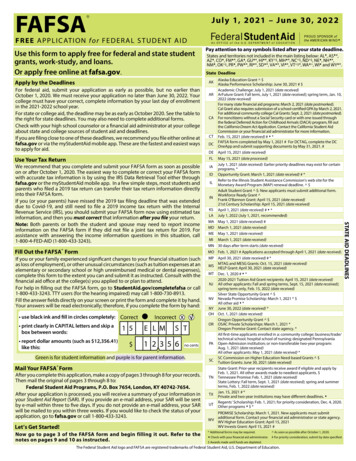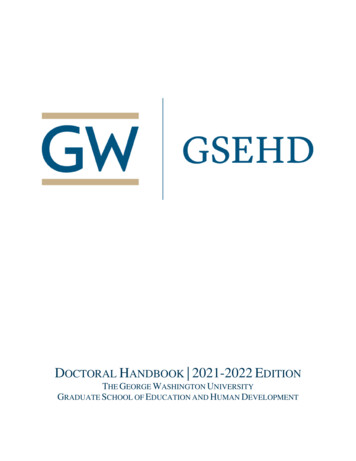
Transcription
DOCTORAL HANDBOOK 2021-2022 EDITIONTHE GEORGE WASHINGTON UNIVERSITYGRADUATE SCHOOL OF EDUCATION AND HUMAN DEVELOPMENT
The George Washington UniversityGraduate School of Education and Human DevelopmentTABLE OF CONTENTSIntroduction: Overall Framework . 3Phases and Steps of Doctoral Study . 3Phase 1: Pre-Candidacy . 4Primary Advisor: Your Guide to Scholarly Development . 4The Role of the Primary Advisor . 4Program Plan: Your Working Agreement . 5Program Plan of Study . 5Making Adjustments to Courses on Your Program Plan of Study . 5Minimum Course and Research Requirements . 5Residency Requirement . 6Transfer Credits . 6Course of Study . 7Monitoring Your Progress: DegreeMAP . 7Academic Requirements . 7Maintaining Continuous Enrollment Status . 8Continuing Research (0940) . 9Continuous Enrollment (CE) . 9Leave of Absence (LOA). 9Registration Procedures . 10Concurrent Enrollment . 10Eight-Year Limit . 10Comprehensive Examination . 11Eligibility . 11Registration Requirements . 11Scheduling Comprehensive Exams . 12Comprehensive Exam Structure . 12Exam Day Guidelines . 13Comprehensive Exam Evaluation . 13Phase 2: Candidacy . 14Dissertation Research Proposal . 14Dissertation Committee . 14Dissertation Proposal . 17Proposal Approval Process . 18IRB Submission Process . 19Dissertation Research. 20Dissertation Research Registration: 8999 and 0940 . 20Guidelines for the Dissertation. 21The Dissertation Defense . 21Dissertation Oral Examination Committee . 22DOCTORAL HANDBOOK, 2021-2022 EDITION1
The George Washington UniversityGraduate School of Education and Human DevelopmentDissertation Defense Planning and Procedures . 22Dissertation Defense Outcomes . 24Final Steps After Dissertation Defense . 25Graduation . 26Additional Information . 27The Student Appeals Process. 27Exiting the Doctoral Program and Graduating with an MA or EdS Degree. 29Financing Your Graduate Education . 30Graduate Assistantships . 30Tuition Awards . 30Endowment Awards . 30Student Loans and Work Study Opportunities. 30Maintaining Federal Student Loan Eligibility . 30Half-Time/Full-Time Certification. 31University Policies . 31Academic Integrity . 31Change of Personal Information . 31Immunization Requirement . 31Privacy of Records .31Student Conduct .32Equal Opportunity Policy. 32Sexual Harassment Policy . 32Appendices . 33Appendix A: Doctoral Student Checklist . 33Appendix B: GSEHD Doctoral Research Methods Sequence . 36Appendix C: Dissertation Committee Structure . 38Appendix D: Sequence of Events during the Dissertation Oral Defense . 39Please note: Important forms are available online at http://gsehd.gwu.edu/students.DOCTORAL HANDBOOK, 2021-2022 EDITION2
The George Washington UniversityGraduate School of Education and Human DevelopmentINTRODUCTION: OVERALL FRAMEWORKYour program, as described by the GW Bulletin, is your contract with the university. ThisDoctoral Student Handbook states applicable policies and procedures to doctoral study at theGraduate School of Education and Human Development (GSEHD). The stated policies andprocedures apply to all doctoral degree programs, but each doctoral program may imposeadditional requirements and most do. Please contact your program for additional programspecific information.GSEHD may change some of the policies, requirements, and procedures stated in this handbookduring subsequent years. Students will be informed of important changes that affect them viatheir e-mail addresses, which must be maintained in GWeb.The GSEHD Office of the Dean and the Office of StudentServices provide overall administration and support of allGSEHD doctoral programs. Most student contact will be withthe Office of Student Services. The Office of Student Servicesis located in the GSEHD Office of Student Life townhouse at2136 G Street, NW.PHASES AND STEPS OFDOCTORAL STUDYGSEHD’S OFFICE OFSTUDENT SERVICESThe Office of Student Servicesexists to assist students incomplying with GSEHD’s policiesand procedures and can bereached ral work at GSEHD is divided into two phases: pre-candidacy and candidacy, whichinvolve specific sequential steps:PHASE 1: Pre-Candidacy Program Planning Course of Study Comprehensive ExaminationPHASE 2: Candidacy Dissertation Proposal Dissertation Research Dissertation Defense GraduationThe remainder of this handbook details the applicable policies, regulations, and procedures foreach of these phases and steps. As you progress through your program, you should plan aheadfor subsequent steps with the guidance of this handbook and your advisor.DOCTORAL HANDBOOK, 2021-2022 EDITION3
The George Washington UniversityGraduate School of Education and Human DevelopmentPHASE 1: PRE-CANDIDACYPre-Candidacy is the period from formal admission and first enrollment in a doctoral programthrough successful completion of the comprehensive examination. Critical aspects of precandidacy include program planning with your advisor, completing coursework, and thecomprehensive examination.PRIMARY ADVISOR: YOUR GUIDE TOSCHOLARLY DEVELOPMENTA doctoral primary advisor provides the doctoral student with guidance through the precandidacy period. This advisor may also become the chair or a member of the student’sdissertation committee and provide further guidance through the dissertation work, if desired.You might also be assigned a secondary advisor at the time of admission, who can serve in asimilar role.The Role of the AdvisorSpecific tasks of the advisor include: Guiding the student in the selection of appropriate electives and research courses.Guiding the student in the selection of appropriate field, research, and publishingexperiences that support scholarly development and prepare the student for thecomprehensive examination and dissertation phase.Mentoring the student in their development as a scholar and professional.DOCTORAL HANDBOOK, 2021-2022 EDITION4
The George Washington UniversityGraduate School of Education and Human DevelopmentPROGRAM PLAN: YOUR WORKINGAGREEMENTProgram Plan of StudyYour program, as described by the GW Bulletin, is your contract with the university. Eachcandidate for a doctoral degree receives an official Program Plan of Study upon accepting anoffer of admission. The program plan of study is also available electronically via DegreeMAP(see pg. 9 for more information). This plan outlines the coursework and any additionalrequirements you will need to complete in order to graduate. Students must successfullycomplete all courses and requirements outlined on the official program plan to have their degreeconferred. Please note that while individual courses may be altered (see below), the totalnumber of credits may not change.Your program plan is a working agreement between a doctoral student and the faculty and maybe modified only with agreement of the faculty. If you find inconsistencies in your programplan of study, please contact docgsehd@gwu.edu.Making Adjustments to Courses on Your Program Plan of StudyAdjustments to the program plan of study may only be made in consultation with and approval ofthe primary advisor. To make adjustments, students are to complete a Program Plan Changeform and submit it to the Office of Student Services at docgsehd@gwu.edu. On this form,students should indicate which changes they are making to their program plan (e.g., taking analternate class in place of a required class). If a student is taking a Level B class that is not listedon their original program plan, they must also receive approval from the Research Methodsfaculty (mailto:methodsfac@gwu.edu).Minimum Course and Research RequirementsAll doctoral programs include a minimum of 36 credits of coursework and 12 credits ofdissertation research. Most programs have additional credit requirements. The courserequirements are as follows:1. Research tool courses (9 credit hours). Students must take at least the following:a. EDUC 8120, Group Comparison Designs and Analysis Analyses (3 credit hours)b. EDUC 8122, Qualitative Research Methods (3 credit hours)DOCTORAL HANDBOOK, 2021-2022 EDITION5
The George Washington UniversityGraduate School of Education and Human Developmentc. After completing EDUC 8120 and 8122, students are to take one advanced “LevelB” course in quantitative, qualitative, or mixed-methods research methods (3 credithours). Some programs require more than one Level B course. See Appendix B formore details on research methods courses.2. Remaining course credits may include core program requirements and courses approved byyour advisor to be taken outside of your program, department, and GSEHD. These courses canalso include additional research methods courses, again with approval of your advisor.3. CNSL, CPED, EDUC, HOL, or SPED 8998, Pre-dissertation Seminar (3 credit hours). Someprograms require students to complete two sections (6 credits) of 8998. (Note: the PhD inEducation does not require an 8998 course.)Residency RequirementGSEHD requires that all doctoral candidates complete a minimum of 36 credit hours ofcoursework (including internships and independent study but excluding dissertation research) atGSEHD (often referred to as “in residence”). Individual doctoral programs may require morecredits.The term “in residence” is used in the GW Bulletin to mean “courses that are registered for atGW and taken at GW or through the consortium of universities” after being admitted to a degreeprogram.Transfer CreditsGraduate credits earned in nondegree status at GW, in other degree programs at GW, or fromother institutions can be applied to GSEHD doctoral programs only if all of the followingcriteria are met:1.2.3.4.5.6.They were taken at an accredited college or university.They were completed in the past five years.They were passed with a grade of “B” or better.They have not been used to fulfill requirements for another degree program.They are not used to satisfy the 36 credit hour residency requirement.They have been approved by the student’s advisors as applicable to the student’s degreeprogram.These are the minimum general requirements for credits to be applied to doctoral program plans.Individual doctoral programs may set additional requirements, and exceptions may requireDean’s review.To seek approval for transfer credits, complete the Program Plan Change form (see previoussection for more information). If the credits were earned at anDOCTORAL HANDBOOK, 2021-2022 EDITION6
The George Washington UniversityGraduate School of Education and Human Developmentinstitution other than GW, you must also submit an official transcript showing the completion ofthose courses. This is often done at the time of admission, but can be done at any point whileyou are in coursework.While enrolled in a GW degree program, Foggy Bottom campus students may take courses atother DC-area institutions through the Consortium. Consortium courses count toward theresidency requirement and will appear on your GW transcript automatically; you do not need toapply for transfer credit for a Consortium course. Check the GW Graduate Bulletin carefully forpolicies and procedures guiding consortium registration. Note: Consortium policies are set bythe Presidents of the member institutions and not by GSEHD.COURSE OF STUDYMonitoring Your Progress: DegreeMAPDegreeMAP allows you to see how many credits you have completed, your current GPA, andwhat courses you have remaining; providing a helpful "snapshot" of where you are in yourprogram. GW uses DegreeMAP to clear students for graduation, so please check it frequently tomake sure that it is accurate. If you have any questions about your DegreeMAP, please feel freeto contact docgsehd@gwu.edu.Accessing DegreeMAP Log in to GWeb and click on the Student Records and Registration link. Select the Student Records Information Menu. Click on the DegreeMAP link. Click “Launch DegreeMAP” to view your degree requirements and your individualacademic history.Academic RequirementsIn order to be in good academic standing and eligible to graduate, students must earn an overallgrade-point average of 3.0 (a B). No more than two grades (six credit hours) of C or a singlegrade of F is permitted throughout the doctoral program.Students whose grade-point average falls below 3.0, or earn a C in more than six credits, or asingle grade of F must consult with their academic advisor and prepare a written statement forthe Associate Dean of Doctoral Studies explaining the cause of the academic issues and a planfor successful program completion.DOCTORAL HANDBOOK, 2021-2022 EDITION7
The George Washington UniversityGraduate School of Education and Human DevelopmentIn consultation with the Program Director, the Associate Dean for Doctoral Studies will thendiscuss the issue with the student to determine whether continuation in the program ispermitted. The student may be removed from the program in the event of more than twogrades of C, a single F, or a GPA below 3.0. Students may appeal this decision to the PostMaster’s Appeal Committee consistent with the procedures described in this document. If agrade of F is received, the grade is included in the grade-point average whether or not the courseis repeated.An instructor may give a grade of Incomplete (I) if a student is unable to complete the work of thecourse before the end of the semester. Incompletes can only be granted in advance of the datewhen grades must be reported, so if you plan to request an Incomplete, please discuss with yourinstructor as early as possible. Incompletes can also only be granted if you are in good academicstanding and your prior performance and attendance in the class have been satisfactory. Studentswho receive a grade of I must subm
The George Washington University Graduate School of Education and Human Development DOCTORAL HANDBOOK 2021-2022 EDITION 6, c. After completing EDUC 8120 and 8122, students are to take one advanced “Level B” course in quantitative, qualitative, or mixed-methods research methods (3 credit hours). Some
